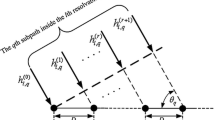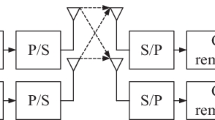Abstract
Space-time coded orthogonal frequency division multiplexing (OFDM) transmitter diversity techniques have been shown to provide an efficient means of achieving near optimal diversity gain in frequency-selective fading channels. For these systems, knowledge of the channel parameters is required at the receivers for diversity combining and decoding. In this paper, we propose a low complexity, bandwidth efficient, pilot-symbol-assisted (PSA) channel estimator for multiple transmitter OFDM systems. The pilot symbols are constructed to be nonoverlapping in frequency to allow simultaneous sounding of the multiple channels. The time-varying channel responses are tracked by interpolating a set of estimates obtained through periodically transmitted pilot symbols. Simulations are used to verify the effectiveness of the proposed estimator and to examine its limitations. It is also shown that the PSA channel estimator has a lower computational complexity and better performance than a previously proposed decision-directed minimum mean square error MMSE channel estimator for OFDM transmitter diversity systems.
Similar content being viewed by others
Author information
Authors and Affiliations
Corresponding author
Rights and permissions
About this article
Cite this article
Lee, K.F., Williams, D.B. Pilot-Symbol-Assisted Channel Estimation for Space-Time Coded OFDM Systems. EURASIP J. Adv. Signal Process. 2002, 374703 (2002). https://doi.org/10.1155/S111086570200080X
Received:
Revised:
Published:
DOI: https://doi.org/10.1155/S111086570200080X




